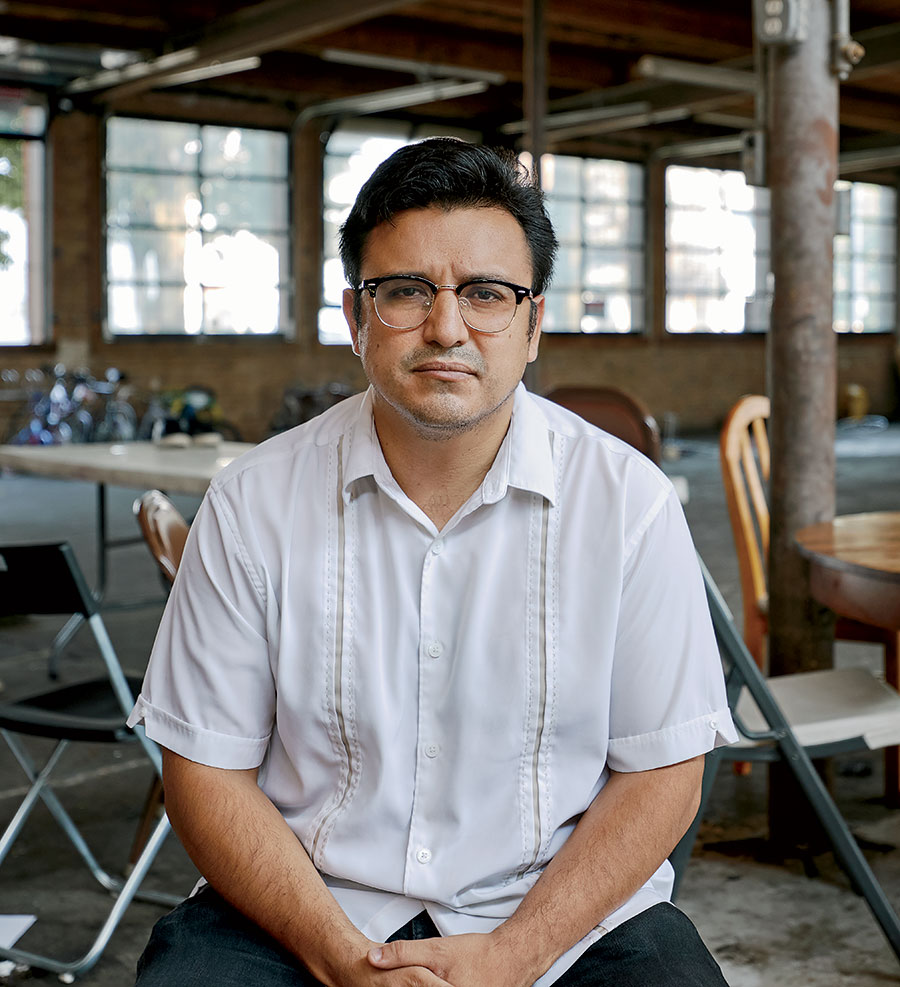Since Texas governor Greg Abbott began shipping busloads of undocumented migrants to Chicago in August 2022, the city has seen an influx of more than 13,000 of these newcomers, and it’s had to scramble to come up with ways to house them. The results have been messy: There’s been backlash from Black residents who feel resources are being diverted from their neighborhoods, and several police officers were accused of improper sexual contact with migrants temporarily placed at the 10th District station.
On the front lines is Byron Sigcho-Lopez, 25th Ward alderperson. He helped establish Todo Para Todos, a community-run shelter in Pilsen that took in migrants who had been housed at the 12th District station. (In early September, the shelter closed due to lack of funding and volunteers.) As chair of the City Council’s Committee on Housing and Real Estate, Sigcho-Lopez, an immigrant from Ecuador, will play an important role in finding permanent homes for migrants.
Behind the scenes, how has the city’s approach shifted from when the first bus of migrants arrived?
The previous administration really didn’t have a plan, other than just opening up a few respite centers and shelters. Mayor Lightfoot spent [$120 million] in hotels and other policies that were never intended to provide any sustainable solution. Time was lost in coordinating an effort to address this huge issue. It is a problem that demands federal intervention. What has changed is the new administration’s collaborative approach in addressing the seriousness of this problem.
There are several hundreds of people who are going to be relocated to more humane conditions in the 46th Ward. This administration continues to try to identify locations: There’s a discussion to use empty parishes, empty churches. We have to collaborate to repurpose these sites that are subsidized by property taxes. In this state of emergency, we’ve got to bring faith leaders, legislators, everyone to the table to develop solutions. I just got a text from a reporter: “Seems like we got another three buses from Texas today.” So when does it stop?
What does the situation with these migrants look like? Do they want to stay in Chicago?
We are, as sanctuary cities, the recipients of refugees and migrants who are fleeing violence, fleeing disinvestment, fleeing cruelty at the border, being separated from family members, being misled to believe they’re going to be united later, only to find out that’s not the case. Many of them have come to Chicago only because that’s where the bus they were put on in Florida or Texas was headed. They are not even told where they are going. Many are asking to be able to work. But only three out of 10 asylum seekers are able to receive full consideration of employment. You can see systemic racism playing out when you have Ukrainian refugees getting different treatment than refugees coming from the global south — the Ukrainians came with a protected status that allowed them to work. Unfortunately, many people from the global south did not come with the same protective measures.
What can be done to change that?
That’s something that we are advocating for with the federal government. Many migrants are not able to work, and they’re desperate. Mayor Johnson is doing everything he can, but this issue of work permits is a federal issue. In a recent City Council meeting, there was a call for federal authorities, who seem to be completely disconnected from the reality, to come and see the challenges that refugees are facing. We have in Chicago an opportunity to change those policies nationally.
“You can see systemic racism playing out when you have Ukrainian refugees getting different treatment than refugees coming from the global south.”
What else needs to be done on the state and federal levels?
Illinois is a welcoming state, but just recently Governor Pritzker stopped the registration of undocumented patients in the public health system — something that will have tremendous repercussions as the need continues to grow. We need for our government to commit to comprehensive immigration reform. We need the federal government to stop destabilizing countries abroad and to start having common-sense international policies. We must understand that the peace and the stability of the global south is connected to the well-being and the future of our country as well.
So this is a global issue?
Many of the migrants arriving in Chicago come from Venezuela. We see countries like that, that are now failed states because of the fossil fuel industry. Transnational companies are making decisions that are devastating for entire communities. And now we’re seeing the aftereffects. The federal government must understand that if we continue to create these humanitarian corridors of migration, we’re going to see more and more people coming.
Locally, what’s the long-term solution for housing these migrants?
We’re talking about making sure that we move from housing as a commodity to making housing a human right. We have a plan to build 120,000 units of housing [not just for migrants]. I think that we can create more shelters, more housing, more opportunity, because those are the cornerstone. We need to make sure that the Chicago Housing Authority starts being the agency that they claim to be, which is an agency to invest in community housing, not to privatize and subsidize developers.
This issue sounds very personal to you.
I am a father of triplets, so my perspective has, if anything, become more urgent. I am not going to normalize children, newborns, pregnant women in police stations treated inhumanely. I live in Pilsen, a historic port of entry for generations. I’m proud of being part of a coalition that is fighting for a sanctuary city. Martin Luther King Jr. said, when he came to Chicago, that if the labor movement and the communities in Chicago can come together to address segregation, or racism and inequality, it will happen everywhere in the world. And I believe that.



